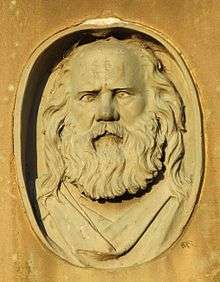Samuel Bamford

Samuel Bamford (28 February 1788 – 13 April 1872),[1] was an English radical and writer, who was born in Middleton, Lancashire.
Biography
Bamford was one of five children born to Daniel Bamford (a muslin weaver and part-time teacher, and later master of the Salford workhouse), and his wife, Hannah. After his father withdrew him from Manchester Grammar School Bamford became a weaver, and then a warehouseman in Manchester.[2] In 1817 he was imprisoned in the New Bailey Prison in Salford on suspicion of high treason, on account of his political activities. From there he was taken to London and examined before the Privy Council presided over by Lord Sidmouth as home secretary. After promising to be of future good behaviour he was released and was then able to return to live in his cottage at Middleton with his wife Jemima.[3]
In August 1819, Bamford led a group from Middleton to St Peter's Fields, to attend a meeting pressing for parliamentary reform and the repeal of the Corn Laws. There they witnessed the Peterloo Massacre, and Bamford was arrested and charged with treason. Although the evidence showed that neither he nor any of his group had been involved in the violence, he was found guilty of inciting a riot and sentenced to a year in Lincoln gaol. The experience of the massacre made a deep impression on Bamford, convincing him that state power would always succeed against radical militancy. He came to be seen as a voice for radical reform, but opposed to any activism that involved physical force.[2]
Bamford was the author of poetry (mostly in standard English)[4] but of those in dialect, several of those showing sympathy with the conditions of the working class became widely popular. His Passages in the Life of a Radical (1840–44) is an authoritative history of the condition of the working classes in the years after the Battle of Waterloo. He also compiled The Dialect of South Lancashire (Manchester: John Heywood, 1850). He died at Harpurhey on 13 April 1872 and was given a public funeral, attended by thousands. A memorial obelisk was unveiled in Middleton Cemetery in 1877. Part of the inscription reads: "Bamford was a reformer when to be so was unsafe, and he suffered for his faith."[5]
Bibliography


Bamford's publications include:
- 1817: An Account of the Arrest and Imprisonment of Samuel Bamford, Middleton, on Suspicion of High Treason
- 1819: The Weaver Boy, or Miscellaneous Poetry
- 1843: Homely Rhymes
- 1840–44 Passages in the Life of a Radical (published in parts with many later editions, includes a glossary of Lancashire words).[6]
- 1844: Walks in South Lancashire and on its Borders. With letters, descriptions, narratives and observations current and incidental.
- 1849: Early Days, 2nd ed. 1859
- 1850: Tawk o'Seawth Lankeshur, by Samhul Beamfort
- 1853: Life of Amos Ogden
- 1854: The Dialect of South Lancashire, or Tim Bobbin's Tummus and Meary, with his Rhymes, with Glossary
- 1864: Homely Rhymes, Poems and Reminiscences
See also
References
- ↑ S. Bamford, 'Early Days', (London 1849) p. 1 "I have always been given to understand that I was brought into this world on the 28th day of February in the "Gallic era-eighty eight ;" [1788]"
- 1 2 Spence, Peter (September 2004). "Bamford, Samuel (1788–1872)". Oxford Dictionary of National Biography. Oxford University Press. Retrieved 2008-02-15.
- ↑ Lockett, T. A. (1968) Three Lives: Samuel Bamford, Alfred Darbyshire, Ellen Wilkinson. London: University of London Press; pp. 9-10
- ↑ Hollingworth, Brian, ed. (1977) Songs of the People. Manchester: Manchester University Press; p.151
- ↑ "Samuel Bamford Memorial". National Recording Project. Public Monument and Sculpture Association. Retrieved 2008-02-15.
- ↑ Jarndyce catalogue: The Romantic Background c.1780–1850 (London, 2015), item 219. Retrieved 31 March 2015.
External links
- Works by or about Samuel Bamford in libraries (WorldCat catalog)
- Bamford's "Passages in the Life of a Radical" and "Early Days" in two volumes edited with an introduction by Henry Dunckley ("verax") London: T. Fisher Unwin, Paternoster Square: MDXCCCXCIII
- Works by Samuel Bamford at LibriVox (public domain audiobooks)

- "Archival material relating to Samuel Bamford". UK National Archives.
- Biography & selected writings at gerald-massey.org.uk
- Biography at thisismiddleton.co.uk
- Publications by & about Bamford at the Internet Archive
 Stephen, Leslie, ed. (1885). "Bamford, Samuel". Dictionary of National Biography. 3. London: Smith, Elder & Co.
Stephen, Leslie, ed. (1885). "Bamford, Samuel". Dictionary of National Biography. 3. London: Smith, Elder & Co.  Chisholm, Hugh, ed. (1911). "Bamford, Samuel". Encyclopædia Britannica (11th ed.). Cambridge University Press.
Chisholm, Hugh, ed. (1911). "Bamford, Samuel". Encyclopædia Britannica (11th ed.). Cambridge University Press.